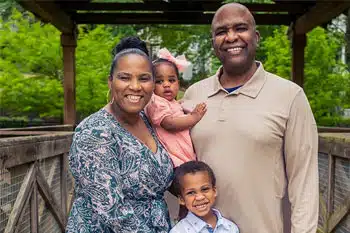
Adoption can be a beautiful way to begin or expand your family. However, adoption can also be challenging. There are complex steps to complete, adoption laws to follow, and challenging emotions to navigate. You can count on Lifetime Adoption to help you overcome these challenges and fulfill your dreams.
Feeling anxious about the details is a normal response, especially when it is something you’ve never done before. There are a lot of different questions that will pop into your mind. But don’t worry! You are not alone in feeling a little bit overwhelmed at what the journey toward adoption will be like.
Here, we will answer some common questions about adoption costs and adoption requirements we’ve gotten from families considering domestic adoption in the United States. (Currently, Lifetime does not offer services for international adoptions.)
Table of Contents
- An Overview of the Adoption Process
- Adoption Requirements
- Can we adopt a newborn?
- How do we know if we’re ready to adopt after experiencing infertility?
- What should I look for when selecting an adoption agency?
- What are the key legal milestones and timeframes I should expect?
- What is post-placement supervision, and what should I expect?
- Can you break down the specific costs involved in adoption?
- What’s the difference between open and closed adoption?
- How do I prepare my other children for adoption?
An Overview of the Adoption Process
When considering adoption, think about what type of adoption you are most interested in.
First, determine how old you want the child to be. Do you prefer bringing home a newborn? Or perhaps you are open to a toddler or school-aged child. Or maybe you have always thought about adopting an older child or a sibling group. All these adoption options are available.
Newborn or infant adoption is usually the most common request we get at Lifetime Adoption from adoptive parents.
Toddler adoptions do happen as well. These children are between one year old and three years old, and they are placed for adoption for a variety of reasons. If you choose this option, you will be given the child’s history, in addition to important medical and developmental information that you’ll need to know about.
Adopting an older child is a great option for families who want to bypass the newborn or toddler phase. Oftentimes, older kids are placed in the foster care system, so choosing this type of adoption will give a child a loving, permanent home in which they can continue to grow and mature.
A big part of the adoption process is completing an adoption home study. This typically involves a criminal background check, personal references, and a social worker’s visit to your home. There will also be a review of your financial situation and medical history.
Your Lifetime coordinator has referrals to qualified home study providers nationwide. If you are in Florida, we would be thrilled to complete your home study ourselves at our Florida adoption agency!
Working with an adoption agency will also require some different paperwork. Your Lifetime Adoption coordinator will make sure you know what paperwork is involved so you can get everything submitted on time and to the right people.
Adoption Requirements
We, along with the expectant parents, are looking for families that can provide a healthy, stable life for a child. Applicants must be at least 21 years old and demonstrate a stable lifestyle.
We will have you fill out an application and will review it in detail. Lifetime Adoption limits the number of families we work with monthly. This ensures that each family gets the personalized attention they need.
After the screening process, we will determine if you are selected to contract with us to start the adoption journey.
You’re well on your way to adopting a baby!
Once you have been cleared to meet with expectant parents, you will be able to start the match process. After a birth mother decides to match with you, you will work with her as well as the adoption coordinator to create a plan of action that covers the hospital and birth plan, plus details like contact during and after pregnancy.
Can we adopt a newborn?
Yes. Infant adoptions are common. Every day we have prospective birth parents calling our team at Lifetime Adoption. We work with expectant mothers as well as those that have already given birth to their child.
One of the adoption requirements we will help you create is a family profile that will be presented to birth mothers. Each birth mother has different qualities that she is seeking in a family. If she selects you to talk to, you can start the process of getting to know each other to see if it’s a good match.
How do we know if we’re ready to adopt after experiencing infertility?
We know that your path to considering adoption was not easy. Adoption after infertility is very common. According to a National Council for Adoption survey in 2021, more than one-third of adoptive parents said they were inspired to adopt after experiencing infertility. Adopting after infertility brings with it a unique need for preparation given the grief and loss that many infertile couples have experienced.
To answer the question about adoption readiness, think about why you are hoping to adopt. Are you making this decision because you feel hopeful and ready to welcome something new? Or do you feel that adoption is your only choice? Additionally, if you are ready and willing to meet the adoption requirements and fees, that is a good indication that you are ready as well.
Processing Grief
While there are no right or wrong answers, being honest with yourself is important. Couples who have spent years experiencing infertility and failed fertility treatments need time to process the grief and loss of not being able to have a biological child. Adopting a child won’t automatically resolve this grief and loss, and adoption shouldn’t be looked at as a cure for infertility.
Processing grief is a difficult, yet crucial first step in adopting after infertility. Even though this grief may never go away entirely, you should be able to manage these feelings in a healthy way. It’s in the best interest of you, your spouse, and the child that you adopt if you can avoid rushing this step. By taking the time you need to work through these emotions, you’ll be emotionally ready to prioritize the child that you will adopt. If you feel that you have fully processed your grief, you are likely ready to pursue adoption.
Every person’s experience with infertility is unique, but you always deserve respect, care, and compassion. As a trusted adoption resource, we can provide you with comprehensive information customized to your needs and outlook as someone who has already walked a difficult road toward starting or growing your family.
What should I look for when selecting an adoption agency?
Research is crucial when selecting an adoption agency or professional:
Key Questions to Ask:
- What is your success rate and average wait times?
- What services are included in your fees?
- How do you support both adoptive and birth families?
- What is your approach to matching families?
- What post-placement and post-adoption services do you provide?
Red Flags to Avoid:
- Promises of quick placements or guaranteed outcomes
- Excessive pressure to accept a match
- Lack of transparency about fees or processes
- Poor communication or responsiveness
- Unwillingness to provide references
What are the key legal milestones and timeframes I should expect?
The adoption process involves several key legal milestones with specific timeframes that vary by state. Generally, birth mothers have a revocation period (typically 48-72 hours to several days after birth) during which they can change their mind about the adoption plan. After this period expires and legal consent is given, the adoption moves into the post-placement phase.
The finalization process usually takes three to 12 months after placement, depending on state requirements and court schedules. During this time, the child lives with the adoptive family while completing post-placement supervision requirements.
What is post-placement supervision, and what should I expect?
Most states require post-placement visits by a licensed social worker for a specified period before the adoption can be finalized. These visits typically occur at one month, three months, and six months after placement, though requirements vary by state. The social worker will assess how the child is adjusting to their new home and ensure the placement is successful.
Post-placement reports document the child’s development, their attachment to you, and the overall family adjustment. These reports are submitted to the court as part of the finalization process. Adoptive families should view these visits as supportive check-ins rather than inspections.
Can you break down the specific costs involved in adoption?
The costs of a domestic adoption vary and are based on many different factors. The average cost of an adoption can range anywhere from $5,000 to $70,000, although it can be much less costly than that. In other words, adoption does not have to be cost-prohibitive; you don’t have to be a wealthy family to adopt a child.
Adoption costs can be complex, but understanding the typical fee structure helps families budget effectively:
Agency Fees ($15,000-$40,000):
- Application and intake fees
- Matching services
- Case management throughout the process
- Post-placement supervision and reporting
Legal Fees ($2,500-$7,000):
- Adoptive family attorney
- A separate birth parent attorney (if required by state)
- Court filing fees
- Document preparation and review
Pregnancy-Related Expenses for the Birth Mother (varies widely):
- Medical expenses not covered by insurance
- Living expenses during pregnancy (where legally permitted)
- Counseling services
- Legal representation
Home Study Costs ($1,500-$3,000):
- Social worker fees
- Background checks and fingerprinting
- Home visits and report preparation
Additional Expenses:
- Travel costs for out-of-state adoptions
- Hospital and delivery expenses
- Newborn care items and supplies
- Document fees (birth certificates, etc.)
There are different methods you can raise the funds needed to adopt. For example, there are adoption tax credits available. In addition to saving your own money and budgeting for an adoption, fundraisers and other adoption benefit events are very common ways to plan for adoption fees.
Lifetime works with people of all kinds: teachers, nurses, truck drivers, daycare workers, business owners, and much more. Adoption requires some financial planning, but keep in mind that many adoptive families are often working-class folks who simply have a heart for bringing an adopted child into their home.
Still, there are monetary considerations, especially if you think you may need financial support to pay for independent attorneys or other professional adoption fees.
What’s the difference between open and closed adoption?
Open adoption involves ongoing contact between birth parents, adoptive parents, and the child. This contact can range from occasional letters and photo exchanges to regular visits and direct communication. Benefits of open adoption include:
- Ongoing medical and family history updates
- The child’s ability to ask questions directly
- Reduced wondering and fantasy about their birth family
- Potential extended support network
What is semi-open adoption?
Semi-open arrangements typically involve communication through a third party (like the adoption agency), with identifying information kept confidential. Families may exchange letters, photos, and updates without direct contact.
What about closed adoption – is that still an option?
In closed adoptions, there is no ongoing contact between parties, and identifying information remains confidential. While less common today, some prefer this arrangement for privacy or safety reasons.
How do we determine the right level of openness for our family?
The level of openness should be discussed thoroughly with your adoption professional and should align with both adoptive and birth parent preferences. Remember that openness preferences may evolve over time, and flexibility can be beneficial for all parties involved.
How do I prepare my other children for adoption?
If you have children already, preparing them for a new sibling through adoption requires thoughtful planning:
Young Children (Ages 3-6):
- Use simple, honest language about how babies join families
- Read adoption-themed children’s books together
- Involve them in age-appropriate preparation activities
- Address any concerns about their own security in the family
School-Age Children (Ages 7-12):
- Provide more detailed explanations about the adoption process
- Discuss how their role as a big sibling will be special
- Allow them to participate in nursery preparation
- Address questions about birth families and adoption openly
Teenagers:
- Include them in appropriate discussions about the adoption journey
- Discuss how family dynamics and responsibilities may change
- Ensure they have support and space to express concerns
The bottom line is that when it comes to adoption requirements and the fees associated, you are not alone. Many people have traveled the road you are on right now. Many of them were able to achieve their dream of adopting a child despite what they at first perceived to be a daunting process and financial obstacles.
The best approach is to address those obstacles honestly and with an open mind. Only then can you begin the work of overcoming those obstacles in order to put together a plan that works best for you and your family.
Editor’s Note: This article was originally published on May 26, 2021, and has since been updated.
As Vice President of Lifetime Adoption, Heather Featherston holds an MBA and is passionate about working with those facing adoption, pregnancy, and parenting issues. Heather has conducted training for birth parent advocates, spoken to professional groups, and has appeared on television and radio to discuss the multiple aspects of adoption. She has provided one-on-one support to women and hopeful adoptive parents working through adoption decisions.
Since 2002, she has been helping pregnant women and others in crisis to learn more about adoption. Heather also trains and speaks nationwide to pregnancy clinics to effectively meet the needs of women who want to explore adoption for their child. Today, she continues to address the concerns women have about adoption and supports the needs of women who choose adoption for their child.
As a published author of the book Called to Adoption, Featherston loves to see God’s hand at work every day as she helps children and families come together through adoption.





0 Comments